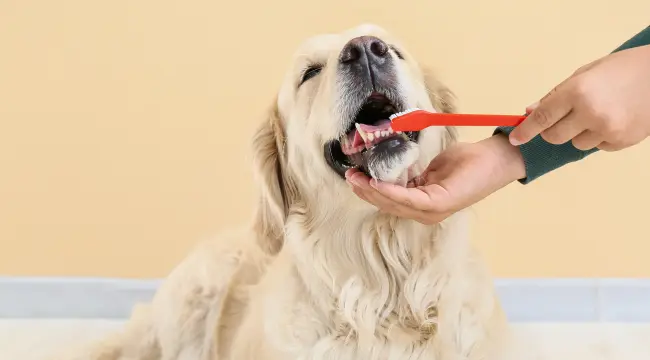
We all want our furry companions to live long, happy and healthy lives. While we may take our pets for regular check-ups and follow a balanced diet, there’s one aspect of pet care that often gets overlooked – dental health.
It’s estimated that up to 80% of dogs are likely to develop dental problems by the age of 3 years old; If left untreated, these dental problems may lead to chronic pain, infection and even heart disease. Luckily, there’s a simple solution – brushing your dog’s teeth!
Brushing your dog’s teeth isn’t just about keeping your dog’s breath fresh, it’s about maintaining their overall well-being. The importance of brushing your dog’s teeth is a topic that deserves more attention, and that’s exactly what we aim to do in this article. From understanding the potential risks of neglecting this aspect of pet care to learning the correct brushing techniques, we’ve got you covered. So prepare to sink your teeth into a topic that’s more important than you may realize!
The Risks of Pet Dental Disease
Pet dental disease, often referred to as periodontal disease, is a common condition affecting dogs and cats. It involves the build-up of bacteria in the form of plaque and tartar on your pet’s teeth. Over time, these bacteria can cause inflammation and infection of the gums (gingivitis). If left untreated, this can progress to periodontitis, which affects the deeper structures supporting the teeth.
Pets suffering from periodontal disease may exhibit a range of unpleasant symptoms, including foul breath, unsightly tartar buildup, and tender gums. If left unattended, this condition can lead to painful inflammation and tooth loss. But it’s not just about teeth – the bacteria from the mouth can sneak into the bloodstream, wreaking havoc on vital organs such as the heart, liver, and kidneys.
Not only that, chronic dental disease can significantly impact your pet’s quality of life, causing discomfort during eating and potentially leading to changes in appetite and weight loss. Therefore, maintaining your pet’s dental health is not just about preserving their smile, but also about ensuring their overall well-being.
Make Brushing Your Dog’s Teeth Fun and Safe
Believe it or not, with proper training and the right tools, brushing your dog’s teeth can be as enjoyable as a good belly rub! Start by making tooth brushing a positive and rewarding experience for your pet – use treats, praise and love to help make the whole experience enjoyable.
Always make sure to use toothbrushes and toothpaste that are safe for your pet; human toothpaste often contains artificial sweeteners like xylitol – this is extremely toxic to dogs. Instead choose an ‘enzymatic’ toothpaste. This contains enzymes that actively break down any plaque that may have built up on your dog’s teeth.
Tips for successful tooth brushing
Too many times innocent dog owners have ended up being bitten because their dog didn’t like having its teeth brushed. Here are a few tips that can help make tooth brushing a breeze:
- Start slow: Start by letting your pet smell and taste the toothpaste.
- Use positive reinforcement: Reward your pet with treats, love and praise after a successful brushing session.
- Be gentle: Apply a light amount of pressure when brushing to avoid discomfort.
- Choose toothpaste your dog loves: Make tooth brushing fun by choosing toothpaste flavors that your dog enjoys – there’s plenty of meaty options available!
Save Money on Dental Treatments
Brushing your dog’s teeth isn’t just great for their health, it can also save you some cash!
Think about it this way – investing a little time and money now in your dog’s dental hygiene could save you a lot more in the long run. Regular brushing of your dog’s teeth helps to prevent the build-up of harmful bacteria, which left unchecked, can lead to serious dental diseases that require expensive veterinary treatment.
While a toothbrush and pet-friendly toothpaste may cost you a few dollars, treating advanced periodontal disease could set you back hundreds, if not thousands. Plus, by maintaining your dog’s oral health, you’re also helping to safeguard their overall wellbeing, potentially saving on future vet bills for related health issues. So, by incorporating tooth brushing into your pet care routine, you’re not just investing in your dog’s health, but also making a financially savvy move!
The importance of vet check-ups
While brushing your dog’s teeth is a great way to keep their teeth and gums healthy, it doesn’t replace the need for regular vet check-ups. Your vet can offer an array of preventative care options including dental cleanings, tooth extractions, and treatment for gum disease. Make sure to schedule a dental check-up for your pet at least once a year. This can help further protect your dog from developing serious dental and health issues in the future.
Brushing alternatives
There are several alternatives for those dogs who are not fans of the toothbrush:
- Dog Dental Chews and Chew Toys: These are designed to help clean your dog’s teeth as they chew. They can help reduce plaque and tartar build-up, and many dogs find them enjoyable.
- Oral Sprays and Gels: These products are applied directly to your dog’s teeth and gums, and can help to kill bacteria and freshen breath.
- Dental Wipes and Finger Pads: These can be used to gently clean your dog’s teeth and gums. They’re less invasive than a toothbrush, which can make them a good option for dogs who dislike having their teeth brushed.
- Dental Diets and Treats: Certain pet foods and treats are formulated to help clean your dog’s teeth as they eat.
- Water Additives: These products are added to your dog’s drinking water and can help to reduce plaque and tartar build-up.
- Professional Cleanings: Regular professional dental cleanings by a veterinarian can help to maintain your dog’s oral health.
While there are plenty of home remedies for smelly dog breath, brushing your dog’s teeth is still the gold standard.
Conclusion
Dental health plays a major role in the overall health and well-being of your pet. By brushing your dog’s teeth on a regular basis, you can help reduce the risks of dental disease, avoid expensive dental treatments, and enjoy a positive bonding experience with your furry companion.
Remember, pet care isn’t something that should be left to the last minute. Make sure to prioritize your pet’s dental health and schedule regular check-ups with your vet to ensure optimal health and happiness for your furry friend.



